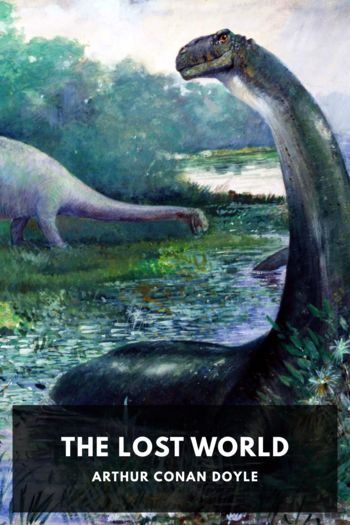The Lost World, Arthur Conan Doyle [fastest ebook reader txt] 📗

- Author: Arthur Conan Doyle
Book online «The Lost World, Arthur Conan Doyle [fastest ebook reader txt] 📗». Author Arthur Conan Doyle
Our learned men looked at each other with some hesitation.
“Personally, I am unable to classify the creature with any certainty,” said Summerlee, lighting his pipe from the fire.
“In refusing to commit yourself you are but showing a proper scientific reserve,” said Challenger, with massive condescension. “I am not myself prepared to go farther than to say in general terms that we have almost certainly been in contact tonight with some form of carnivorous dinosaur. I have already expressed my anticipation that something of the sort might exist upon this plateau.”
“We have to bear in mind,” remarked Summerlee, “that there are many prehistoric forms which have never come down to us. It would be rash to suppose that we can give a name to all that we are likely to meet.”
“Exactly. A rough classification may be the best that we can attempt. Tomorrow some further evidence may help us to an identification. Meantime we can only renew our interrupted slumbers.”
“But not without a sentinel,” said Lord John, with decision. “We can’t afford to take chances in a country like this. Two-hour spells in the future, for each of us.”
“Then I’ll just finish my pipe in starting the first one,” said Professor Summerlee; and from that time onwards we never trusted ourselves again without a watchman.
In the morning it was not long before we discovered the source of the hideous uproar which had aroused us in the night. The iguanodon glade was the scene of a horrible butchery. From the pools of blood and the enormous lumps of flesh scattered in every direction over the green sward we imagined at first that a number of animals had been killed, but on examining the remains more closely we discovered that all this carnage came from one of these unwieldy monsters, which had been literally torn to pieces by some creature not larger, perhaps, but far more ferocious, than itself.
Our two professors sat in absorbed argument, examining piece after piece, which showed the marks of savage teeth and of enormous claws.
“Our judgment must still be in abeyance,” said Professor Challenger, with a huge slab of whitish-colored flesh across his knee. “The indications would be consistent with the presence of a saber-toothed tiger, such as are still found among the breccia of our caverns; but the creature actually seen was undoubtedly of a larger and more reptilian character. Personally, I should pronounce for allosaurus.”
“Or megalosaurus,” said Summerlee.
“Exactly. Any one of the larger carnivorous dinosaurs would meet the case. Among them are to be found all the most terrible types of animal life that have ever cursed the earth or blessed a museum.” He laughed sonorously at his own conceit, for, though he had little sense of humor, the crudest pleasantry from his own lips moved him always to roars of appreciation.
“The less noise the better,” said Lord Roxton, curtly. “We don’t know who or what may be near us. If this fellah comes back for his breakfast and catches us here we won’t have so much to laugh at. By the way, what is this mark upon the iguanodon’s hide?”
On the dull, scaly, slate-colored skin somewhere above the shoulder, there was a singular black circle of some substance which looked like asphalt. None of us could suggest what it meant, though Summerlee was of opinion that he had seen something similar upon one of the young ones two days before. Challenger said nothing, but looked pompous and puffy, as if he could if he would, so that finally Lord John asked his opinion direct.
“If your lordship will graciously permit me to open my mouth, I shall be happy to express my sentiments,” said he, with elaborate sarcasm. “I am not in the habit of being taken to task in the fashion which seems to be customary with your lordship. I was not aware that it was necessary to ask your permission before smiling at a harmless pleasantry.”
It was not until he had received his apology that our touchy friend would suffer himself to be appeased. When at last his ruffled feelings were at ease, he addressed us at some length from his seat upon a fallen tree, speaking, as his habit was, as if he were imparting most precious information to a class of a thousand.
“With regard to the marking,” said he, “I am inclined to agree with my friend and colleague, Professor Summerlee, that the stains are from asphalt. As this plateau is, in its very nature, highly volcanic, and as asphalt is a substance which one associates with Plutonic forces, I cannot doubt that it exists in the free liquid state, and that the creatures may have come in contact with it. A much more important problem is the question as to the existence of the carnivorous monster which has left its traces in this glade. We know roughly that this plateau is not larger than an average English county. Within this confined space a certain number of creatures, mostly types which have passed away in the world below, have lived together for innumerable years. Now, it is very clear to me that in so long a period one would have expected that the carnivorous creatures, multiplying unchecked, would have exhausted their food supply and have been compelled to either modify their flesh-eating habits or die of hunger. This we see has not been so. We can only imagine, therefore, that the balance of nature is preserved by some check which limits the numbers of these ferocious creatures. One of the many interesting problems, therefore, which await our solution is to discover what that check may be and how it operates. I venture to trust that we may





Comments (0)